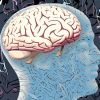-
 +21 +1
+21 +1Psychopathic women exhibit low cardiac defense responses, study finds
New research published in Biological Psychology explores the relationship between psychopathic fearlessness and low defensive cardiac reactivity. According to the new findings, women with high scores in the psychopathic trait of fearlessness tend to exhibit reduced heart rate changes when faced with an intense and unexpected stimulus. But this relationship was not found among men.
-
 +23 +1
+23 +1Psychopathic individuals struggle to recognize and resonate with the emotion in music, study finds
New research published in Cognition and Emotion investigated the possibility that psychopathic traits would inhibit one’s ability to experience or identify emotions in music. The findings indicate that, as predicted, individuals who have psychopathic traits are less likely to correctly identify emotions conveyed in music. This research provides another clue to the challenges individuals with psychopathic traits may have identifying and experiencing emotion.
-
 +25 +1
+25 +1New psychology study suggests shame plays key role in link between narcissism and maladaptive daydreaming
A study in Italy has found that characterological shame mediated the link between vulnerable narcissism and maladaptive daydreaming. The new findings suggest that vulnerable narcissists deal with their deep-seated sense of inadequacy by fantasizing about situations where their shame is overcome. This link was also present with grandiose narcissism, but was weaker. The study was published in Personality and Individual Differences.
-
 +19 +1
+19 +1Researchers discover two psychological traits that connect narcissism to sadism
Researchers In Italy were curious if sadism and grandiose narcissism may be related and what traits may facilitate this relationship. Their findings indicate that malicious envy and narcissistic rivalry are the characteristics that connect sadism to grandiose narcissism. The research has been published in Personality and Individual Differences.
-
 +14 +1
+14 +1People with personality disorders are more likely to sign up for psychology studies – here's why that's a problem
Many psychological studies rely on participants to give up their time to take part in experiments or complete questionnaires. They take part because they get paid or because they are required to as part of their university course. But, beyond this, not much is known about what motivates people to take part in these studies.
-
 +18 +1
+18 +1New study disputes the birth order theory that later-born are "born to rebel"
Those born later in a family may not be "born to rebel," as posited by some researchers. A new study published in Personality and Individual Differences found later-born individuals are not more likely to have tattoos, and although they do test higher in measures of risk-taking and sensation seeking, they did not demonstrate a higher need for uniqueness.
-
 +14 +1
+14 +1New research shows trolls don't just enjoy hurting others, they also feel good about themselves
A new Australian study shows if a person has high levels of sadism and high self-esteem, they are more likely to troll.
-
 +17 +1
+17 +1Two "dark" personality traits help explain the link between childhood adversity and suicide risk
New research suggests that facing troubling conditions such as abuse or neglect during childhood is associated with the development of “dark” personality traits, which in turn is linked to heightened suicidality. The findings have been published in Personality and Individual Differences.
-
 +22 +1
+22 +1Inducing narcissistic feelings leads people to overestimate their intelligence
Does narcissism really make people think that they’re smarter than they are, even if they aren’t a narcissist? A study published in the Journal of Research in Personality suggests that inducing narcissistic feelings can lead individuals to overestimate their own intelligence.
-
 +16 +1
+16 +1Study finds psychopaths may not remember emotionally negative events accurately
New research suggests that those with psychopathic personality traits are less susceptible to creating false memories of negative events. The findings indicate that individuals high in the psychopathic trait of fearless dominance were less likely to produce false memories when exposed to negative stimuli.
-
 +20 +1
+20 +1Dark personalities perceive pro-environmental behaviors as more costly and less beneficial
People with “dark” personality traits tend to behave in less environmentally friendly ways in everyday life, and view pro-environmental behaviors as imposing a greater burden, according to new research published in Frontiers in Psychology. The findings provide evidence that personality traits influence how people perceive the costs and benefits associated with pro-environmental behaviors.
-
 +19 +1
+19 +1Study finds twelvefold higher mortality risk among psychopathic female offenders
New research highlights the health dangers associated with an antisocial lifestyle. A study of psychopathic female offenders revealed a mortality risk that was 12 times higher compared to the general population. The findings were published in the journal Frontiers in Psychiatry.
-
 +3 +1
+3 +1Dark personality traits linked to a greater desire to enhance oneself using technological methods
People with dark personality traits are more likely to want to enhance their brain power with futuristic technologies, according to new research published in the Journal of Cognitive Enhancement. “Enhancement of human abilities has been a prominent topic throughout human history, but has received little attention from psychological research,” said study author Elena Schönthaler of the University of Graz.
-
 +17 +1
+17 +1Bodybuilders with a history of steroid use are more likely to exhibit psychopathic traits, risk-taking behavior, and anger problems
Recent findings published in the journal Scientific Reports shed new light on the risks associated with the use of steroids among male athletes. This time, researchers found that bodybuilders with a history of steroid use were more likely to exhibit psychopathic tendencies, sexual and substance use risk-taking behaviors, and anger issues.
-
 +4 +1
+4 +1Psychopathic personality traits are associated with lower occupational prestige
Having a psychopathic personality appears to hamper professional success, according to new research published in Personality and Individual Differences. The findings cast doubt on the alleged benefits of psychopathy in the workplace.
-
 +10 +1
+10 +1Students with Dark Triad traits cheat don’t feel responsible for their own learning, making them more likely to cheat
Plagiarism and cheating are persistent problems in higher education, note the authors of a new paper in Personality and Individual Differences. Better ways of combatting academic misconduct are clearly needed. And in their paper, Guy J. Curtis at the University of Western Australia and colleagues report that they’ve found one: encouraging students to take personal responsibility for their own learning.
-
 +15 +1
+15 +1People higher in neuroticism perceive themselves as older
Personality and subjective age are related, according to a new study published in the journal Psychology and Aging. Feeling younger than one’s age is associated with numerous positive outcomes, including a lower risk of incident dementia and mortality. Conversely, “an older subjective age can help identify individuals who are at risk for poor health, cognitive decline, and impairment,” write Yannick Stephan and colleagues.
-
 +21 +1
+21 +1Study finds an unexpected upside to imposter syndrome
Even many successful people harbor what is commonly called impostor syndrome, a sense of being secretly unworthy and not as capable as others think. First posited by pyschologists in 1978, it is often assumed to be a debilitating problem. But research by an MIT scholar suggests this is not universally true. In workplace settings, at least, those harboring impostor-type concerns tend to compensate for their perceived shortcomings by being good team players with strong social skills, and are often recognized as productive workers by their employers.
-
 +15 +1
+15 +1Men with higher levels of dark personality traits exhibit a greater tendency towards infidelity
Having a partner with a ‘dark personality’ can put you at higher risk of suffering repeated infidelity, a study published in the Acta Psychologica journal reveals. The concept of a ‘dark personality’ comes from a triad proposed by personality theorists and includes subclinical narcissism (focus on oneself), psychopathy (lack of empathy, remorselessness), and Machiavellianism (cynicism, acting in self-interest). Other traits associated with a dark personality are sadism, selfishness, moral disengagement, and resentment.
-
 +16 +1
+16 +1Psychopathy May Not Be a Mental Disorder, But Totally Something Else According to Researchers
For more than half a century, the kinds of antisocial personality traits we think of as psychopathic – such as a lack of remorse, aggression, and disregard for the wellbeing of others – have been associated with mental illness.
Submit a link
Start a discussion




















